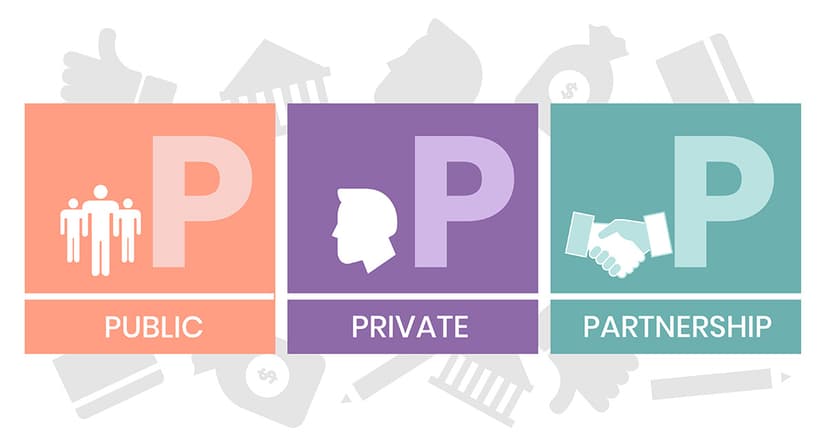Public-Private Partnerships(PPPs) Services
Investing in technical and vocational education and training benefits both businesses and communities
Strategic Public-Private Partnerships (PPPs) represent transformative mechanisms for mobilizing private sector resources, expertise, and innovation to enhance TVET system capacity and educational infrastructure development. Our comprehensive PPP services provide governments, educational institutions, and development organizations with specialized expertise in structuring, negotiating, and implementing partnership models that leverage private sector engagement for sustainable workforce development and economic growth.
Contemporary PPP frameworks in TVET contexts serve as catalysts for system modernization, enabling educational institutions to access cutting-edge technology, industry expertise, and sustainable financing mechanisms while maintaining public sector oversight and social objectives. Our PPP development approach integrates international best practices in partnership structuring with context-specific solutions, ensuring that collaboration models deliver mutual value while advancing national development priorities and educational quality standards.
Through systematic application of PPP structuring methodologies, stakeholder engagement protocols, and risk-sharing frameworks, we facilitate partnerships that transform TVET infrastructure, enhance program relevance, and create sustainable pathways for youth employment and economic development. Our services support the entire PPP lifecycle from feasibility assessment through implementation and performance monitoring, ensuring successful partnership outcomes that benefit all stakeholders.
Strategic implementation of Public-Private Partnerships provides fundamental mechanisms for TVET system enhancement, resource mobilization, and sustainable development impact. In the context of developing economies and educational transformation initiatives, well-structured PPPs serve multiple critical functions that directly impact workforce development effectiveness and economic growth:
Resource Mobilization and Infrastructure Development
PPPs enable educational institutions to access private sector capital, technology, and expertise that would otherwise be unavailable through traditional public funding mechanisms. This resource mobilization supports infrastructure development, equipment modernization, and technology integration essential for delivering industry-relevant TVET programs that meet contemporary workforce requirements and quality standards.
Innovation Transfer and Technology Advancement
Private sector partners bring cutting-edge technologies, innovative teaching methodologies, and industry best practices that modernize TVET delivery and enhance educational quality. Through structured knowledge transfer mechanisms, PPPs facilitate adoption of advanced manufacturing technologies, digital learning platforms, and industry-standard practices that prepare students for modern workplace requirements.
Economic Development and Employment Generation
Strategic PPPs create direct linkages between educational institutions and labor markets, facilitating graduate employment, entrepreneurship development, and local economic growth. Private sector engagement ensures that training programs align with industry needs, creating pipelines of qualified workers that support business expansion and economic diversification while addressing youth unemployment challenges.
Program Quality and Industry Relevance Enhancement
Private sector expertise in project management, quality assurance, and operational efficiency enhances TVET program delivery and institutional effectiveness. Industry partners provide insights into emerging skill requirements, validate curriculum content, and offer work-based learning opportunities that ensure graduates possess relevant competencies for immediate productive employment.
Social Inclusion and Marginalized Group Support
Well-designed PPPs incorporate social responsibility components that expand access to quality TVET for women, minorities, rural populations, and economically disadvantaged groups. Private sector partners often provide scholarships, mentorship programs, and targeted support services that reduce barriers to technical education and promote inclusive economic development.
Sustainability and Long-term Viability
PPP models create sustainable financing mechanisms that reduce dependence on public budgets while ensuring long-term program viability. Through revenue-sharing arrangements, performance-based contracts, and co-investment models, PPPs establish self-sustaining educational programs that continue delivering benefits beyond initial investment periods.
While Public-Private Partnerships offer significant benefits, unsuccessful or poorly structured PPPs can create challenges that undermine educational objectives and compromise public interest:
Misaligned Objectives and Conflicting Priorities
Without careful structuring and governance frameworks, tensions between private sector profit motives and public sector social objectives can compromise educational quality, equity, and accessibility. This misalignment can result in exclusion of disadvantaged groups, focus on profitable programs at the expense of social needs, and erosion of public education principles.
Inadequate Risk Allocation and Financial Exposure
Poorly structured PPPs can expose public institutions to excessive financial risks, contingent liabilities, and long-term obligations that compromise fiscal sustainability. Without appropriate risk-sharing mechanisms, public sectors may bear disproportionate costs while private partners capture excessive returns, creating public resistance and political backlash.
Capacity Constraints and Implementation Challenges
Limited public sector capacity for PPP structuring, negotiation, and management can result in unfavorable contract terms, weak performance monitoring, and inability to enforce partnership obligations. This capacity gap creates vulnerabilities to exploitation, reduces partnership effectiveness, and limits achievement of intended development outcomes.
Regulatory Gaps and Governance Weaknesses
Absence of comprehensive PPP regulatory frameworks, transparent procurement processes, and effective oversight mechanisms creates risks of corruption, favoritism, and suboptimal partner selection. Weak governance undermines public confidence, deters reputable private partners, and compromises partnership sustainability.
Market Failures and Limited Private Interest
In contexts with limited private sector capacity, weak business environments, or insufficient market incentives, PPPs may fail to attract qualified partners or generate expected benefits. This can result in failed procurement processes, substandard service delivery, and wasted public resources on unsuccessful partnership initiatives.
Social Resistance and Stakeholder Opposition
Without adequate stakeholder engagement and communication strategies, PPPs can face resistance from labor unions, civil society organizations, and communities concerned about privatization, job losses, or reduced access to education. This opposition can derail partnership implementation and create political costs that outweigh potential benefits.
Successful PPP implementation in TVET contexts requires careful selection of appropriate partnership models based on institutional capacity, market conditions, and development objectives. Common PPP models include Build-Operate-Transfer (BOT) arrangements for infrastructure development, management contracts for institutional operations, service delivery partnerships for specialized training programs, and hybrid models that combine multiple partnership elements to address complex development challenges.
Our PPP structuring approach emphasizes robust feasibility assessment, comprehensive stakeholder consultation, and transparent procurement processes that ensure optimal partner selection and value for money. We develop detailed partnership agreements that clearly define roles, responsibilities, performance standards, and risk allocation mechanisms while incorporating flexibility for adaptation to changing circumstances and emerging opportunities.
Effective PPP governance requires establishment of dedicated management units, performance monitoring systems, and dispute resolution mechanisms that ensure partnership accountability and continuous improvement. Our implementation support includes capacity building for public sector PPP management, establishment of regulatory frameworks, and development of institutional capabilities for successful partnership oversight and benefit realization throughout the partnership lifecycle.
PPP Strategy Development and Policy Advisory
We provide comprehensive support for developing national and institutional PPP strategies that align with development objectives and educational priorities. Our advisory services include policy framework development, regulatory design, institutional capacity assessment, and strategic planning that creates enabling environments for successful PPP implementation in TVET and education sectors.
Partnership Structuring and Transaction Advisory
Our transaction advisory services guide institutions through the entire PPP development process from project identification through financial close. We provide feasibility studies, option analysis, financial modeling, risk assessment, and contract structuring that ensures optimal partnership design and sustainable value creation for all stakeholders.
Procurement Management and Partner Selection
We design and manage transparent, competitive procurement processes that attract qualified private partners while ensuring value for money and public interest protection. Our procurement services include market sounding, bid documentation development, evaluation support, and negotiation assistance that results in successful partner selection and robust partnership agreements.
Contract Management and Performance Monitoring
Our contract management services establish systems for effective partnership oversight, performance monitoring, and adaptive management throughout the PPP lifecycle. We develop key performance indicators, monitoring frameworks, and reporting systems that ensure partnership accountability while facilitating continuous improvement and benefit optimization.
Stakeholder Engagement and Change Management
We design comprehensive stakeholder engagement strategies that build support for PPP initiatives while addressing concerns and managing resistance. Our services include stakeholder mapping, consultation facilitation, communication planning, and change management support that ensures smooth partnership implementation and sustained stakeholder buy-in.
Capacity Building and Institutional Strengthening
Our capacity building programs develop public sector capabilities for successful PPP identification, structuring, and management. We provide training on PPP fundamentals, financial analysis, contract management, and performance monitoring while supporting establishment of PPP units and institutional frameworks for sustained partnership success.
PPP Promotion and Market Development
We support market development initiatives that attract private sector interest in TVET partnerships through investment promotion, sector dialogues, and demonstration projects. Our promotional services include investor conferences, partnership showcases, and success story documentation that builds market confidence and expands private sector engagement in educational development.

